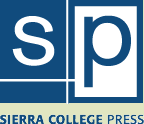A Scotsman in Nevada City: The Adventures of J.D. Borthwick in 1851
John David Borthwick (commonly referred to as J.D.) was a nomadic Scotch author and artist who traveled in Gold Rush California from 1851 to 1854. In 1857, he published the reminiscence of his adventures in Three Years in California. This book, considered one of the most entertaining and accurate depictions of the era, focuses on his experiences in crossing the Isthmus of Panama and on his encounters with gold camps such as Placerville, Foster’s Bar, Downieville, and Carson Hill. Borthwick’s attention to detail and his engaging portrayals of the social life of the early Gold Rush period provide a fascinating insight into those long ago days. 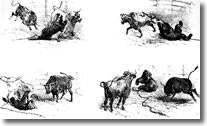 His descriptions of mining techniques, personal interactions, crime, holidays, and entertainment (such as the very popular Bear and Bull fights) offer one of the most complete mosaics of the Age of Gold. Borthwick illustrated his book with his own lithographs which are considered among the most realistic representations of the time. Some of these illustrations are reproduced here.
His descriptions of mining techniques, personal interactions, crime, holidays, and entertainment (such as the very popular Bear and Bull fights) offer one of the most complete mosaics of the Age of Gold. Borthwick illustrated his book with his own lithographs which are considered among the most realistic representations of the time. Some of these illustrations are reproduced here.
Arrival in Nevada City
Among his many stops was early Nevada City. He arrived in the latter part of 1851. He arrived in a foul humor, having spent the night near Bear River, and suffering through what he called “a villainous bad dinner” of “bad salt pork, bad pickled onions, and bad bread.”
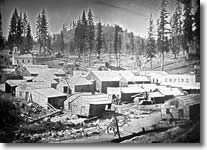 Borthwick’s first assessment of Nevada City was mixed. The first impression was that “The town itself—or, I should say, the ‘City,’ for from the moment of its birth it has been called Nevada City—is, like all mining towns, a mixture of staring white frame-houses, dingy old canvass booths, and log-cabins.” His opinion changed slightly, very slightly, when he went exploring while waiting for his dinner: “I strolled about the town to see what sort of a place it was. It is beautifully situated on the hills bordering a small creek, and has once been surrounded by a forest of magnificent pine-trees, which, however, had been made to become useful instead of ornamental, and nothing now remained to show that they had existed but the numbers of stumps all over the hill-sides. The bed of the creek, which had once flowed past the town, was now choked up with heaps of ‘trailings’—the washed dirt from which the gold has been extracted—the white colour of the dirt rendering it still more unsightly.”
Borthwick’s first assessment of Nevada City was mixed. The first impression was that “The town itself—or, I should say, the ‘City,’ for from the moment of its birth it has been called Nevada City—is, like all mining towns, a mixture of staring white frame-houses, dingy old canvass booths, and log-cabins.” His opinion changed slightly, very slightly, when he went exploring while waiting for his dinner: “I strolled about the town to see what sort of a place it was. It is beautifully situated on the hills bordering a small creek, and has once been surrounded by a forest of magnificent pine-trees, which, however, had been made to become useful instead of ornamental, and nothing now remained to show that they had existed but the numbers of stumps all over the hill-sides. The bed of the creek, which had once flowed past the town, was now choked up with heaps of ‘trailings’—the washed dirt from which the gold has been extracted—the white colour of the dirt rendering it still more unsightly.”
A Night in de Paris
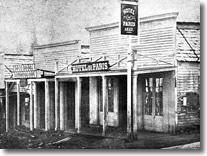 J.D. Borthwick dined at the Hotel de Paris (the location of the hotel is now the site of the Bonanza Market on Broad Street). He relished the meal which he described as “the best-got-up thing of the kind I had sat down to for some months.” The feast of roast beef, soup, cabbage, carrots, turnips, and onions, washed down with copious amounts of coffee and cognac, left Borthwick “powerfully refreshed,” as he put it. By any standard it had to be an improvement over the previous night’s horrible dinner.
J.D. Borthwick dined at the Hotel de Paris (the location of the hotel is now the site of the Bonanza Market on Broad Street). He relished the meal which he described as “the best-got-up thing of the kind I had sat down to for some months.” The feast of roast beef, soup, cabbage, carrots, turnips, and onions, washed down with copious amounts of coffee and cognac, left Borthwick “powerfully refreshed,” as he put it. By any standard it had to be an improvement over the previous night’s horrible dinner.
Following the sumptuous meal, Borthwick repaired to another room and passed the evening in gambling and listening to “pretty good music.” However, the Hotel de Paris was misnamed. It was not a hotel, but a gambling hall and restaurant. Accordingly, Borthwick went searching for a place to stay. “I went to an American hotel close to it,” he wrote, “It was in the usual style of a boarding-house in the mines, but it was a three-decker. All round the large sleeping-apartment were three tiers of canvass shelves, partitioned into spaces six feet long, on one of which I laid myself out, choosing the top tier in case of accidents.”
Shakespeare Next Door
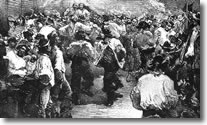 Borthwick spent a memorable night, if a restless one. He recalled: “Next door was a large thin wooden building, in which a theatrical company were performing. They were playing Richard [Shakespeare’s Richard III], and I could hear every word as distinctly as if I had been in the stage-box. … The fight between Richard and Richmond was a very tame affair; they hit hard while they were at it, but it was too soon over. It was one-two, one-two, a thrust, and down went Dick. I heard him fall, and could hear him afterwards gasping for breath and scuffling about on the stage in his dying agonies…. After King Richard was disposed of, the orchestra, which seemed to consist of two fiddles, favoured us with a very miscellaneous piece of music. There was then an interlude performed by the audience, hooting, yelling, whistling, and stamping their feet; and that being over, the curtain rose [and the play continued] …. Some half-dozen men, the only occupants of the room besides myself, had been snoring comfortably all through the performances, and now about a dozen more came in and rolled themselves on to their respective shelves. They had been at the theatre, but I am sure they had not enjoyed it so much as I did.”
Borthwick spent a memorable night, if a restless one. He recalled: “Next door was a large thin wooden building, in which a theatrical company were performing. They were playing Richard [Shakespeare’s Richard III], and I could hear every word as distinctly as if I had been in the stage-box. … The fight between Richard and Richmond was a very tame affair; they hit hard while they were at it, but it was too soon over. It was one-two, one-two, a thrust, and down went Dick. I heard him fall, and could hear him afterwards gasping for breath and scuffling about on the stage in his dying agonies…. After King Richard was disposed of, the orchestra, which seemed to consist of two fiddles, favoured us with a very miscellaneous piece of music. There was then an interlude performed by the audience, hooting, yelling, whistling, and stamping their feet; and that being over, the curtain rose [and the play continued] …. Some half-dozen men, the only occupants of the room besides myself, had been snoring comfortably all through the performances, and now about a dozen more came in and rolled themselves on to their respective shelves. They had been at the theatre, but I am sure they had not enjoyed it so much as I did.”
Popular Young Actress
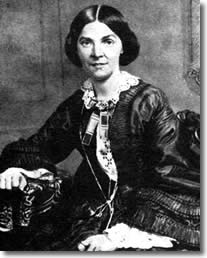 From Borthwick’s descriptions it appears likely that he stayed at the Illinois Boarding House which adjoined one of the first theaters constructed in Nevada City – the Jenny Lind Theater. Both establishments were built in the summer of 1851 over Deer Creek … literally. The buildings projected over the creek on cantilevered foundations. The theater became famous during its brief existence for the appearance of the well-known Chapman family of actors, which featured young Caroline Chapman in leading roles. Caroline became a darling of the miners, and groups of gold seekers would compete to see how loudly they could applaud their favorite young actress. In March 1852, however, the Illinois Boarding House and the Jenny Lind Theater were swept away when a massive flood roared through Deer Creek.
From Borthwick’s descriptions it appears likely that he stayed at the Illinois Boarding House which adjoined one of the first theaters constructed in Nevada City – the Jenny Lind Theater. Both establishments were built in the summer of 1851 over Deer Creek … literally. The buildings projected over the creek on cantilevered foundations. The theater became famous during its brief existence for the appearance of the well-known Chapman family of actors, which featured young Caroline Chapman in leading roles. Caroline became a darling of the miners, and groups of gold seekers would compete to see how loudly they could applaud their favorite young actress. In March 1852, however, the Illinois Boarding House and the Jenny Lind Theater were swept away when a massive flood roared through Deer Creek.
Off to the Mines
J.D. Borthwick spent only a few days in Nevada City and then headed toward a mining camp on the Yuba River about thirty miles away. His sojourn continued for many more months, visiting all of the Gold Rush communities, such as Angels Camp, Volcano, San Andreas, Sonora, Sacramento, Stockton, and finally ending up in San Francisco. The journey was, he said, a grand adventure and the times were “one of the most wondrous episodes in the history of mankind.”
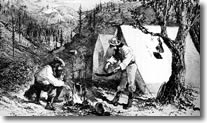 |
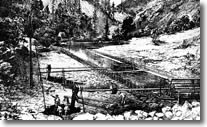 |
| “A Mine Camp” by J.D. Borthwick | “Along the Yuba River” by J.D. Borthwick |
